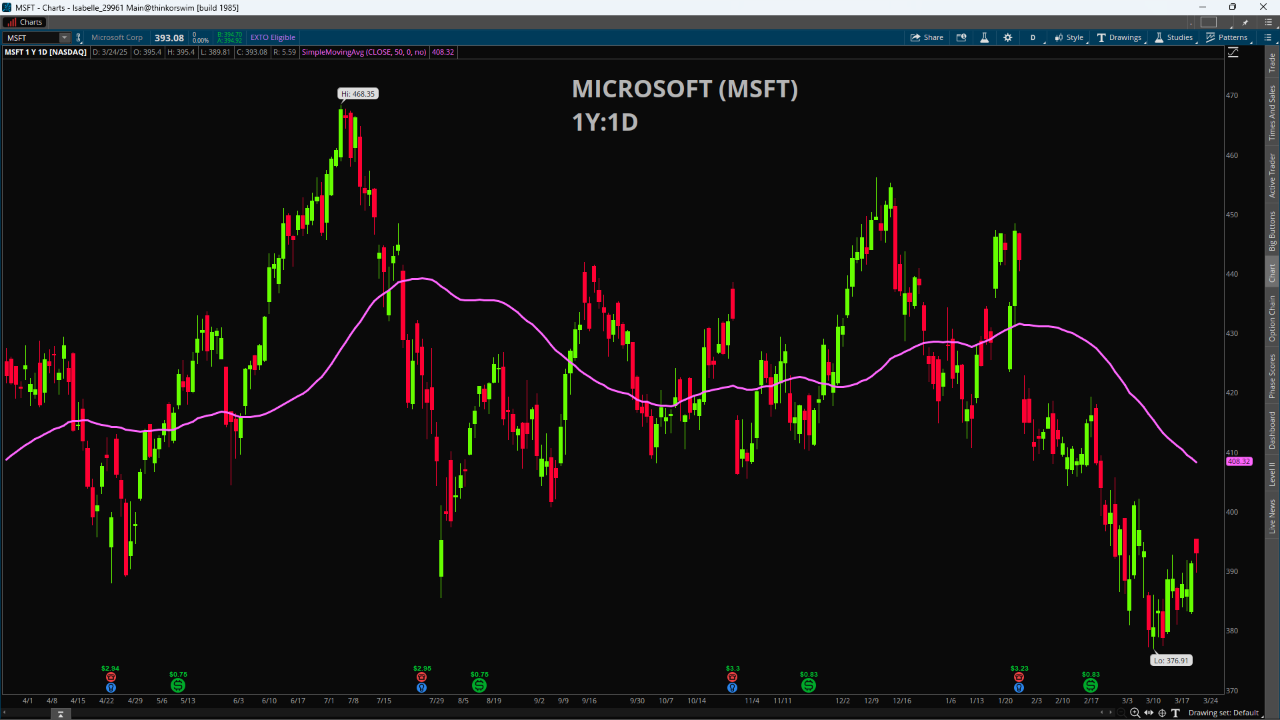
Market Minute: Microsoft – What’s Wrong?!
Microsoft’s (MSFT) stock has seen a consistent downtrend in the share price since hitting all-time highs of $468.35 last July. It is now down 16% from those highs and is off nearly 7% in 2025. While the other Mag 7 stocks hit record highs from late last year until February, Microsoft has struggled for the last 8 months. Most tech stocks have declined in the recent market correction this year, which was triggered by weak macroeconomic figures and tariff concerns. Microsoft has seen concerns over its cloud growth slowdown and a lack of AI profitability. It’s $13 billion investment in Open AI’s ChatGPT has not provided any returns and is not expected to anytime soon. Investors also have raised concerns about the additional $80 Billion investments in AI this year.
Microsoft operates through three primary segments: Productivity and Business Processes, Intelligent Cloud, and More Personal Computing. Each segment contributes to the company’s diversified revenue streams and reinforces its competitive moat. Microsoft’s ability to integrate its offerings—such as embedding AI tools like Copilot into Microsoft 365 and Azure—creates a sticky ecosystem that enhances customer retention and drives cross-selling opportunities. Azure’s market share continues to climb, fueled by digital transformation and hybrid cloud adoption. Azure’s revenue growth exceeded 30% in the most recent quarter, outpacing the broader cloud market, but those numbers have started to decline.
Despite the different revenue streams, continued growth, a rock-solid balance sheet and massive free cash flow, headwinds remain for the tech giant. Microsoft’s Bing search engine failed to gain any meaningful market share despite AI integrations. AWS and Google Cloud challenge Azure’s growth, while competitors like Salesforce (CRM) and Slack (collaboration tools) vie for enterprise customers. A potential economic slowdown could reduce IT spending, impacting Azure and Microsoft 365 growth. All of these have created investor concerns and pressure on the stock. Analysts continue to rate the shares as a ‘Buy’ or ‘Overweight,’ but this has had little positive effect on the stock.
Is Microsoft an under-appreciated stock at these levels? Recently, Jefferies stated they believe the recent selloff in shares of Microsoft represents an attractive entry point due to a now "derisked valuation." Microsoft remains one of Jefferies' favorite large-cap names with a Buy rating and $550 price target. While the analyst community have been wrong over the last few months, maybe investors are waiting for a positive catalyst to get back to buying the stock.
Featured Clips




Charles Schwab and all third parties mentioned are separate and unaffiliated, and are not responsible for one another's policies, services or opinions.


